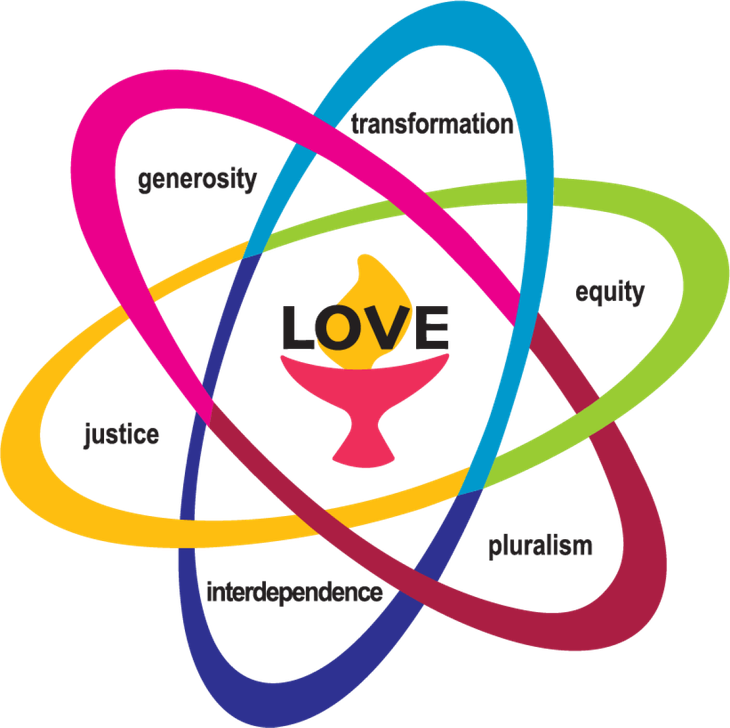Core Values
Welcoming Caring Justice Seeking
Welcoming
One of the core values we hold at the center of our congregation is a commitment to hospitality. A spiritual practice of radical hospitality provides the foundation for our relationships with each other, with visitors and newcomers, and in the wider world. The greeters at the Visitors' Table and Unity Hall; our coffee hosts; all of us sitting near someone we do not yet know; we all know that it is up to each of us to make our congregation and our world the kind of place where all feel welcomed – a world in which all are treated with justice, equality, and compassion. A congregational commitment to welcoming has the potential for transformation – of ourselves, our congregation, and our world. We invite you to consider welcoming and hospitality as your own spiritual practice.
In addition to our core value of welcoming and hospitality, All Souls has been recognized by the Unitarian Universalist Association (UUA) as a “Welcoming Congregation”. This designation means that All Souls participated in the UUA Welcoming Congregation Program and is committed to being intentionally welcoming to lesbian, gay, bisexual and transgender people. For more information about Welcoming Congregations see http://www.uua.org/lgbt/welcoming/program .
We are called to act out of kindness and compassion, and this is reflected in our core value of caring. There are many ways in which the All Souls congregation expresses its commitment to caring. Within our congregation our Caring Committee coordinates efforts to provide support to members and friends who are experiencing a difficulty in their lives, such as the loss of a job, the loss of a loved one, or a serious or chronic medical condition for themselves or a family member. They work to identify and meet the needs within the congregation, enlisting the help of numerous volunteers to prepare meals, offer rides, help with grocery shopping or make hospital visits. Notes of condolence, support and encouragement are also sent. In addition, the Caring Committee coordinates receptions at memorial services. As the need arises, support groups are formed, such as the Bereavement Support Group and the Employment Support Group.
Many pastoral concerns are addressed by our minister. The minister is available to speak with members and friends of the congregation who have personal or spiritual concerns or questions they would like to discuss. Sharing Circle groups also provide a caring environment in which to develop connections within the congregation.
Beyond our walls our commitment to caring is evidenced through our Social Justice work in the community and in the larger world. With open hearts we provide a compassionate and caring community to those in need within our congregation and beyond.
As a congregation and individually we strive to live out our Unitarian Universalist principles and values and promote justice in all of our interactions. We recognize that there are many injustices in our world and we make efforts to bear witness, to take action and to advocate for systemic change. We bear witness by expressing our opinions, participating in vigils and marches, by conducting activities to draw attention to unjust conditions. We take actions in many ways, in many areas. We feed and shelter those in need, we promote fair trade in our dealings with others, and we work to promote peace. We seek to make our presence in our world greener. We work to identify opportunities to make our views known to governmental entities in efforts to change regulations or laws that treat people in an unjust way. You are invited to join us as we work to make this world a better place for all people.
Unitarian Universalist Shared Values
(adopted at the 2024 General Assembly)

The Historic Seven Principles of Unitarian Universalism
Unitarian Universalist congregations affirm and promote seven Principles, which we hold as strong values and moral guides. We live out these Principles within a “living tradition” of wisdom and spirituality, drawn from sources as diverse as science, poetry, scripture, and personal experience.
As Rev. Barbara Wells ten Hove explains, “The Principles are not dogma or doctrine, but rather a guide for those of us who choose to join and participate in Unitarian Universalist religious communities.”
- 1st Principle: The inherent worth and dignity of every person;
- 2nd Principle: Justice, equity and compassion in human relations;
- 3rd Principle: Acceptance of one another and encouragement to spiritual growth in our congregations;
- 4th Principle: A free and responsible search for truth and meaning;
- 5th Principle: The right of conscience and the use of the democratic process within our congregations and in society at large;
- 6th Principle: The goal of world community with peace, liberty, and justice for all;
- 7th Principle: Respect for the interdependent web of all existence of which we are a part.
The seven Principles and six Sources of the Unitarian Universalist Association grew out of the grassroots of our communities, were affirmed democratically, and are part of who we are. Read them as they are written in our UUA Bylaws.

